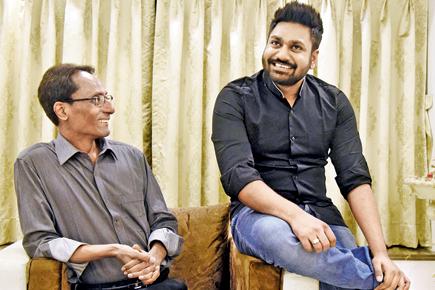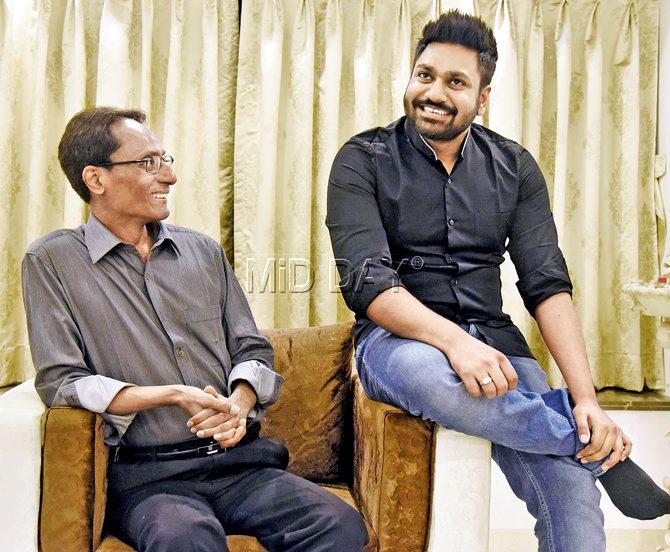Naresh Sharma did the music arrangement for Aashiqui in 1990. His son Mithoon composed music for the sequel. As the father returns to the scene with an indie offering, the two sit down to discuss the making of music


Naresh Sharma, whose single with Benny Dayal will release on Valentine’s Day, at his Versova home with son Mithoon. PIC/Pradeep Dhivar
Neither father Naresh Sharma nor his son Mithoon, it seems, enjoys the spotlight much. It takes weeks of persuasion for the father and son to agree to a meeting at their Versova residence. So, then you can imagine the heartache we suffer when we only see Sharma Sr in the room. "Don't worry, Mithoon is in a recording and will join us soon," assures the 57-year-old, adding, "Even I'll be meeting him after a long time."
But their similarities don't simply end at their media-shyness.
While Naresh did the music arrangement for the 1990 blockbuster Aashiqui, which sealed the success of composers Nadeem-Shravan, Mithoon catapulted the sequel Aashiqui 2 to fame with soul-stirring compositions like Tum Hi Ho. "I still remember Gulshan Kumar, Nadeem-Shravan and Anuradha Paudwal coming over for sessions with my father," says Mithoon, who joins us within a couple of minutes of the conversation — the recording room is in the same house.
The 30-year-old recalls a childhood spent around his father who has worked with leading composers of the era, including Nadeem-Shravan, Jatin Pandit and Anu Malik. But, today he is excited that his father is set to rekindle his musical fervour.
After 18 years of lying low, Naresh is making a comeback with a single in collaboration with singer Benny Dayal which will release on Valentine's Day. The last time you heard him was in 1999 when he'd composed the background score for actor Rishi Kapoor's directorial debut, Aa Ab Laut Chalen, starring Aishwarya Rai, Akshaye Khanna and Rajesh Khanna.
The Valentine's Day release is called Hum Tum and is a peppy love duet with a newcomer from Assam, Jutika Burman. The music is something Naresh says he hasn't attempted in his 40-year-long career. There's another single in the pipeline as well. It's a solo emotional ballad by called Sunvaii, by Benny Dayal. But, he doesn't like to call it a comeback.
"You can never retire from music. But the decision to take a rather long sabbatical was conscious because I wanted to keep up with times and connect with what the new generation wants. So, I kept observing the kind of music being made," says Sharma, who conducted his first orchestra at the age of 17 with brother Pyarelal of the Laxmikant-Pyarelal duo.
In the intervening years, Sharma had a lot to keep up with. "Back in my time, performing with a 100 musicians was the norm. With their help, we would create a score that would add an extra dimension to the movie. Using music to create tension, or the sound of a quickening heartbeat to quicken the viewers' heartbeats, or even the use of silence to leave the audience in wonder and anticipation… there were so many nuances in it," says Sharma, who was instrumental in helping music arrangers get credits with the 1983 Rajiv Mehtra film Ek Jaan Hai Hum followed by Mard, starring Amitabh Bachchan in 1985.
It's the nuances that he learnt from observing his father's tracks that Mithoon says he tries to imbibe in his music.
"My father worked during a period where the human side in composing was a lot more. A song recording was a get-together because there were so many people involved. Now, with the advent of technology, it's more mechanised," says Mithoon, who debuted as a music producer with Mohit Suri's Zeher (2005). He was only 19 years old at the time and he followed it up with film albums like Anwar, The Train and more recently Ek Villain, Sanam Re and Shivaay.
Interestingly, both like to work independently. "If there's one thing that I always tell Mithoon, it's that your song should be your voice, an expression of your soul. Your music has to be your opinion," he says. Which is why both believe that the music of Aashiqui 1 is not even remotely similar to the soundtrack of the sequel. "While both were romantic movies with the hero being a tortured artist, the songs were melancholic but soul-stirring.
Differentiating between our styles is like making a difference between summer and winter. Both are distinct and equally needed."
 Subscribe today by clicking the link and stay updated with the latest news!" Click here!
Subscribe today by clicking the link and stay updated with the latest news!" Click here!









